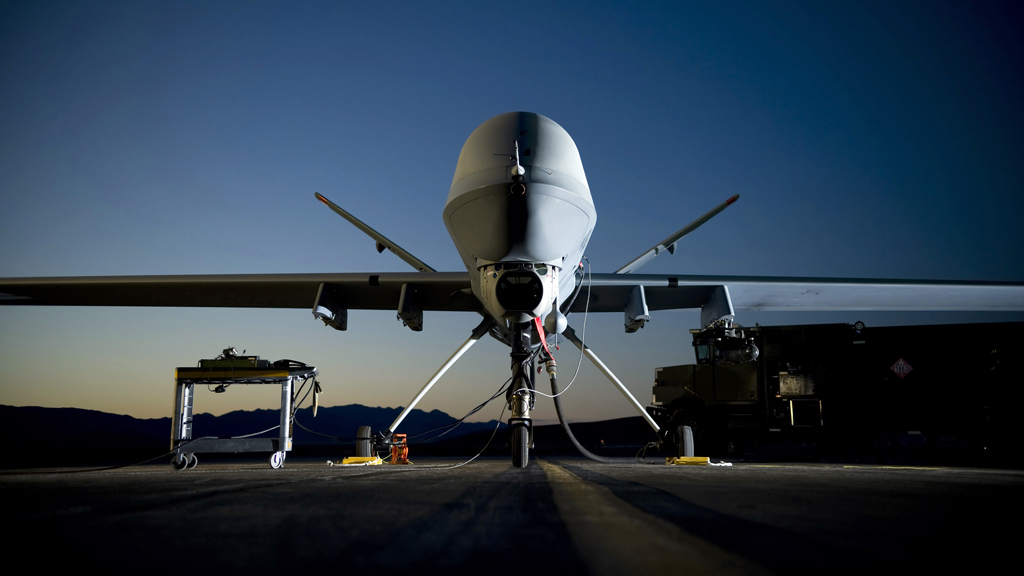Britain to ‘double number of drones in Afghanistan’
Britain boosts to 10 the number of drone aircraft flying combat and surveillance operations in Afghanistan, as the foreign secretary faces questions over UK support for US drones in Pakistan.

In a new squadron of unmanned aerial vehicles (UAVs), five Reaper drones will be sent to Afghanistan and be in operation within six weeks, with control coming, for the first time, from terminals and screens in Britain.
Pilots based in a high-tech site at RAF Waddington will fly the recently bought American-made UAVs, according to the Guardian.
Britain’s existing five Reaper drones, which are used to target suspected insurgents in Helmand province in Afghanistan’s south west territories, have been operated from a US Air Force base in Nevada because Britain has not had the capability.
The government has yet to decide whether the aircraft will remain there after the end of 2014, when most Nato soldiers are scheduled to be withdrawn from Afghanistan.
Britain has used drones in Afghanistan since 2006, and its Reaper drones have flown thousands of hours and fired more than 300 missiles.
Court case
A high court hearing on Tuesday aims to underline whether the UK is giving any support to the CIA’s campaign of drone strikes in Pakistan.
The case has been brought by Noor Khan, whose father was killed in an attack on a local council meeting in 2011.
He is asking Foreign Secretary William Hague to clarify the government’s position on sharing intelligence for use in CIA strikes, and is challenging whether any such activities are legal.
One of the judges hearing the case, Lord Justice Moses, described a “very moving passage” in Mr Khan’s statement of what life was like with the threat of missiles “falling from the sky without warning”.
In the statement, Mr Khan says his community in North Waziristan “is now plagued with fear”, with tribal elders “scared that if we get together we might be targeted again”.
Mothers and wives “plead with the men to not congregate together for fear that they will be targeted … they do not want to lose any more of their husbands, sons, brothers, and nephews”.
Mr Khan adds that most people in the area are poor and have no choice but to stay, “though many want to leave because of the drones”.
Drone strikes are taking their toll on children, almost all of whom “suffer from mental illness and live in constant fear”.
Khan’s lawyer, Rosa Curling, said: “This case is about the legality of the UK government providing ‘locational intelligence’ to the US for use in drone strikes in Pakistan.”
The use of drones is controversial because of fears that civilians can be killed and injured when they fire missiles.
The US has come under particular criticism over the CIA programme of targeted drone killings against militants in Pakistan’s tribal heartlands.
Civilian casualty fears
The Ministry of Defence said: “The MOD only operates its unmanned aircraft in Afghanistan to support UK and coalition forces.
“Reaper is the only remotely piloted aircraft that is armed. On the rare occasions that weapons are used, the same strict rules are followed that govern the use of weapons on manned aircraft.
“The vast majority of unmanned aircraft flying is surveillance and reconnaissance in support of our front-line troops, providing them with vital intelligence and helping to save lives in Afghanistan.
“Since 2006 they have provided over 100,000 hours of persistent intelligence.”
A report by Drone Wars UK last month revealed that since 2007 the UK has spent more than £2bn purchasing, developing and researching drones.
This means annual spending on drones would pay the wages of nearly 30,000 new entrants to the army. The same sum is double the cost of 14 new Chinook helicopters which the Ministry of Defence (MoD) ordered from Boeing last year.
